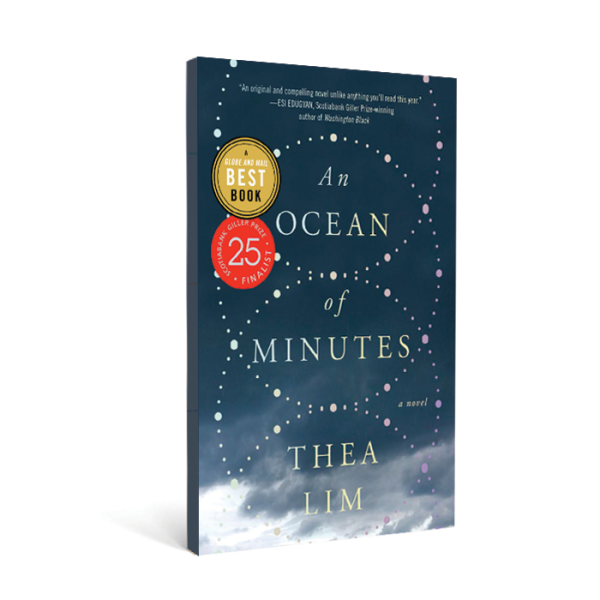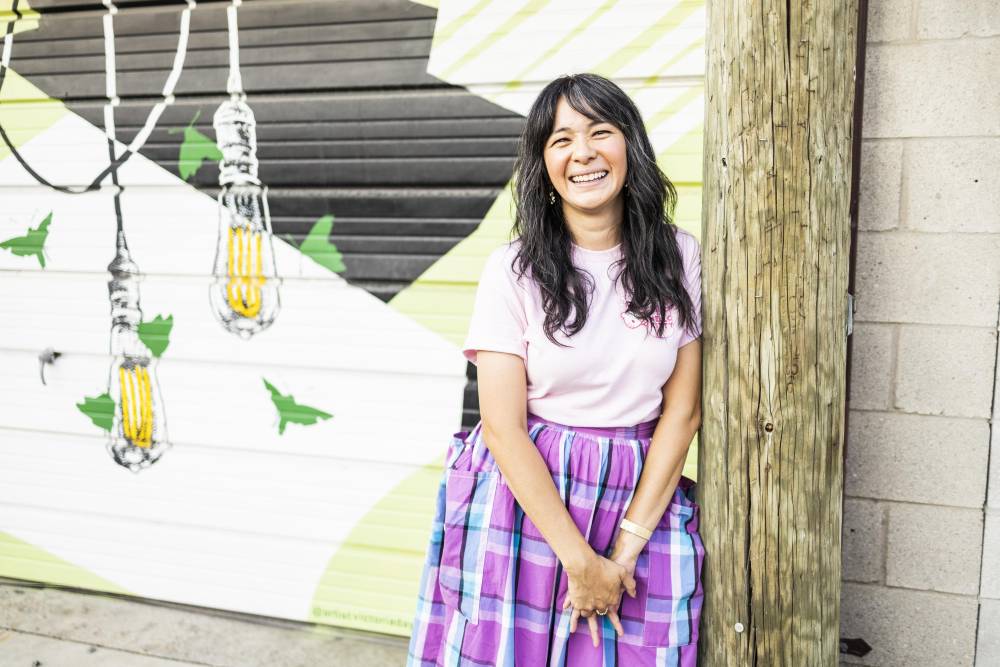Thea Lim does not choose favourites. That’s not necessarily her motto, mind you, but a bit of wisdom she picked up on one of her multiple visits to this, our current age.
It seems too easy to compare Thea’s life and the wisdom she’s gained to that of some metaphysical time traveller who’s dropped in on this space before, but, hey, she started it. By exploring her thoughts on the human experience, love, and migration in her 2018 Giller Prize-shortlisted novel, An Ocean of Minutes, Thea chose to describe all of the above through the lens of a substantially altered past, and the strange, sad, near-future that came with it. This clearly indicates that she, too, like the characters in her novel, can negotiate alternate timelines through our common existence. A neat trick, to say the least.
But still: “People give writers more credit than we deserve,” Thea says, a denial of her time-travelling capabilities, perhaps? What about the inclusion of a too-timely global pandemic as a plot-point in her novel? “It’s our job to pay attention. I didn’t make anything up; I just looked at the news.” Convincing. But maybe, take a closer look at the date on Thea’s daily paper.

In life, in work, in teaching, Thea approaches it all with an understated, even-keeled wonder. Staying true to what she’s learned and how it levels the framework of life and career. So, no surprise that she doesn’t seem surprised by her life’s experiences. Only touched by joy. Is this anti-climactic? Maybe. Or maybe, she knew it was coming. There’s no answer to her method of navigating life. As mentioned, Thea does not choose favourites.
As mentioned, Thea does not choose favourites. What she sees, hears or learns, though, she pays forward. To her students, her colleagues, her readers, herself. And that she might have heard it all before, in an alternate past? Well, that’s how she manages to refine the data so impeccably. Thea’s early life gives some clues to her temporal wanderings; born in Toronto, she moved to China and England, then Texas, back to Canada and Toronto again. Days spent teaching and writing, completing a novel, then waking up to see it hit the height of Canadian creative achievement. Surely, she expected this. Or, maybe, she’s good at feigning astonishment.
By Thea Lim“The value they put on artistic pursuit, in a moment at life with so much pressure on them … It’s so profound, so moving. Having a chance to just sit with them, knowing that the college offers this space for them, it’s so meaningful. I never imagined I’d have a role like that.”
As an undergraduate at the University of Toronto, Lim honed her skills to become the kind of student she’d meet years later as a teacher in that institution and then again as the Barker-Fairley Distinguished Visitor for 2022-2023. While teaching at University College in the writing centre, she gained a deep appreciation of the type of student she might have been. “The value they put on artistic pursuit, in a moment at life with so much pressure on them. … It’s so profound, so moving. Having a chance to just sit with them, knowing that the College offers this space for them, it’s so meaningful. I never imagined I’d have a role like that.” She might never have imagined it … had she not already travelled through the continuum and seen her future experiences laid out, waiting for her.
Always prepared. Unsurprisingly, another turn of phrase upon which Thea relies to navigate time and space. Even in the very few moments when she appears unprepared—say, not realizing that she was keynote speaker at a University College convocation ceremony—Thea’s grip on the continuum is keen. Does the potential for her being unprepared spoil this analogy? Thea’s view on teaching and writing explains the discrepancy: “I think sometimes these things need to be demystified a little bit.” So there. Analogy preserved.
“Making art often has little to no financial value, but it does have value, and here is a very hallowed institution who’s making a decision to put value on this.”
Thea has become prepared by creating a circle between learning and teaching, from the people she’s met at University College, the students who constantly delight her. “It’s very different than what you think it’s going to be,” Thea admits, “in all sorts of wonderful ways. Mundane ways.” Thea’s done the work to create synchronicity between timelines, to turn up the colour in what she’s already seen and imbue the ho-hum with new vibrancy. When she found herself back at U of T, she noticed its familiar stone gargoyles and realized that the past looms large. “Coming here, being here as the Barker-Fairley Visitor, getting a second crack at being here, and listening to people talk” – seemingly, enough for Thea’s many lives.
Staying true; always prepared – no one can dispute that these words make up Thea’s core values. Whether or not they’re her favourite words? Thea ain’t saying. What’s not disputed is how Thea considers learning and teaching the nucleus of her success; how being surrounded by those hungry for information makes her whole. “Being bad is how you get good,” Thea says, another motto, maybe, or a bumper sticker she might have written on spec in another existence. Either way, pouring it out onto the page isn’t a waste; it’s how one gets to the other side.
Teaching is magic -- according to Thea. Also, impossible, as an instructor once told her. “Now, I see it’s true. It’s a great mystery to me how anyone learns anything.” Insisting that this does not mean she is bad at her job, Thea goes on: “Anyone can bring so many things into the classroom and they’re often mysterious to me. How people learn things, carrying so much for them even to carry, and still take things away? I think that comes more from the student than teacher.”
Maybe she’s being too modest, but Thea’s modesty can be explained by the sense of delight she feels in the classroom. “It’s easy to lose your sense of wonder. And it’s amazing to work with students and see them go through that same sense of wonder. I’m so lucky to work with students who bring a real openness. There’s so much goodwill in them; they’re willing to do the weird things I ask, and I still see how joyful they could be.”
As established, Thea’s seen it all before. But, maybe, wonder will always be a revelation. “Time with students, that part of facilitating a space that the college offers, a pause for them to focus on investing time into something that technically doesn’t have financial value? So fantastic. Do you know how nice that is?” Now, we do. Because Thea figured it out first, and taught us.
Travelling through life at the speed of thought. Another Thea-ism picked up in the ether. She sees the high achievers in the writing center and manages to cut through their ambition to remind them just how wise they are.
She listens to them speak and reads what they create and is nevertheless surprised by the depth of their still waters. She sees it in herself, too; when confronted with that ageless worry all creatives have, she feels so grateful that her work at UC has numbed it somewhat: “Making art often has little to no financial value, but it does have value, and here is a very hallowed institution who’s making a decision to put value on this.”
Thea did admit to one instance of choosing favourites: a particular book she was struck by recently. It saved her from an existential crisis brought on by the work demanded by her new novel in progress, causing her to wonder: What is it that writers do, save for making up imaginary people in imaginary situations? This book – Hua Hsu's memoir, titled Stay True, of course – was useful to her; it's specificity, and faithfulness to detail reminded her how fiction writers make something that isn’t real ultimately feel real. The very thing Thea does every day. No matter where she winds up next.
